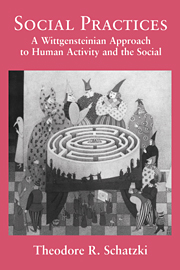Book contents
3 - THE SOCIAL CONSTITUTION OF MIND/ACTION AND BODY
Published online by Cambridge University Press: 17 September 2009
Summary
Philosophers and social theorists once found it unproblematic to conceptualize mind as a distinct and autonomous ontological substratum separate not only from the world, but also from the actions intimately connected with it. The first component of this conception to fall was the autonomy of the fundamental structures and contents of mind from social context. Hegel initiated its decline with the claim that individuals are constituted within Ethical Substance, in the language, institutions, and practices of a society. Although this conception subsequently became paradigmatic for an array of thinkers, these thinkers, including Karl Marx despite his materialism, continued to accord mind distinct existence as a realm or thing.
Cartesianism, understood as the doctrine that mind possesses such distinctness, remained a vital and resilient conception in the late nineteenth century and first few decades of the twentieth century. In philosophy, for example, some version or other of it remained firm for a slew of thinkers, from the analytic innovators Gottlob Frege, Bertrand Russell, and G. E. Moore to such philosophers of consciousness as Ernst Mach, Henri Bergson, Edmund Husserl, and the early Jean-Paul Sartre, from the Vienna School theorists Morris Schlick, Otto Neurath, and Rudolf Carnap to the pragmatist William James and neo-Kantians such as Heinrich Rickert. These theorists were seemingly oblivious, moreover, to the dependency of mental contents on social context. Sigmund Freud and Georgi Lukács also continued to treat mind as a distinct realm, even though the one theorized a socially molded psyche and the other extended Marx's vision of the class determination of consciousness and knowledge.
- Type
- Chapter
- Information
- Social PracticesA Wittgensteinian Approach to Human Activity and the Social, pp. 55 - 87Publisher: Cambridge University PressPrint publication year: 1996



